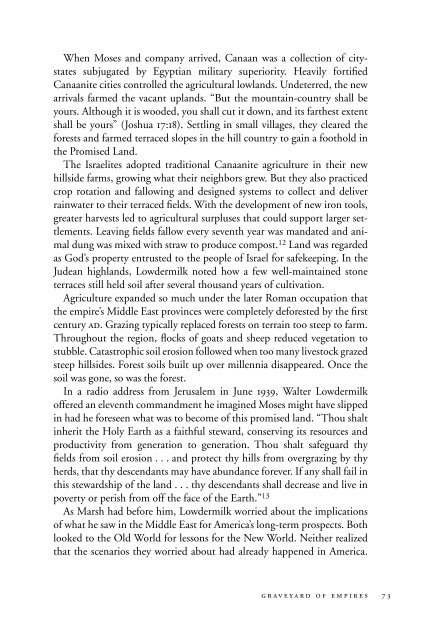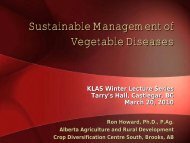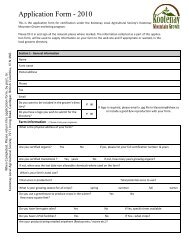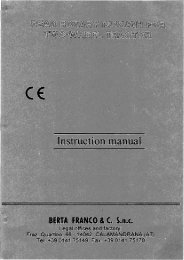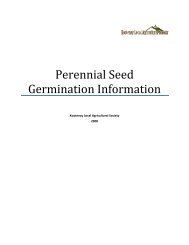Dirt: The Erosion of Civilizations - Kootenay Local Agricultural Society
Dirt: The Erosion of Civilizations - Kootenay Local Agricultural Society
Dirt: The Erosion of Civilizations - Kootenay Local Agricultural Society
You also want an ePaper? Increase the reach of your titles
YUMPU automatically turns print PDFs into web optimized ePapers that Google loves.
When Moses and company arrived, Canaan was a collection <strong>of</strong> citystates<br />
subjugated by Egyptian military superiority. Heavily fortified<br />
Canaanite cities controlled the agricultural lowlands. Undeterred, the new<br />
arrivals farmed the vacant uplands. “But the mountain-country shall be<br />
yours. Although it is wooded, you shall cut it down, and its farthest extent<br />
shall be yours” (Joshua 17:18). Settling in small villages, they cleared the<br />
forests and farmed terraced slopes in the hill country to gain a foothold in<br />
the Promised Land.<br />
<strong>The</strong> Israelites adopted traditional Canaanite agriculture in their new<br />
hillside farms, growing what their neighbors grew. But they also practiced<br />
crop rotation and fallowing and designed systems to collect and deliver<br />
rainwater to their terraced fields. With the development <strong>of</strong> new iron tools,<br />
greater harvests led to agricultural surpluses that could support larger settlements.<br />
Leaving fields fallow every seventh year was mandated and animal<br />
dung was mixed with straw to produce compost. 12 Land was regarded<br />
as God’s property entrusted to the people <strong>of</strong> Israel for safekeeping. In the<br />
Judean highlands, Lowdermilk noted how a few well-maintained stone<br />
terraces still held soil after several thousand years <strong>of</strong> cultivation.<br />
Agriculture expanded so much under the later Roman occupation that<br />
the empire’s Middle East provinces were completely deforested by the first<br />
century ad. Grazing typically replaced forests on terrain too steep to farm.<br />
Throughout the region, flocks <strong>of</strong> goats and sheep reduced vegetation to<br />
stubble. Catastrophic soil erosion followed when too many livestock grazed<br />
steep hillsides. Forest soils built up over millennia disappeared. Once the<br />
soil was gone, so was the forest.<br />
In a radio address from Jerusalem in June 1939, Walter Lowdermilk<br />
<strong>of</strong>fered an eleventh commandment he imagined Moses might have slipped<br />
in had he foreseen what was to become <strong>of</strong> this promised land. “Thou shalt<br />
inherit the Holy Earth as a faithful steward, conserving its resources and<br />
productivity from generation to generation. Thou shalt safeguard thy<br />
fields from soil erosion ...and protect thy hills from overgrazing by thy<br />
herds, that thy descendants may have abundance forever. If any shall fail in<br />
this stewardship <strong>of</strong> the land ...thy descendants shall decrease and live in<br />
poverty or perish from <strong>of</strong>f the face <strong>of</strong> the Earth.” 13<br />
As Marsh had before him, Lowdermilk worried about the implications<br />
<strong>of</strong> what he saw in the Middle East for America’s long-term prospects. Both<br />
looked to the Old World for lessons for the New World. Neither realized<br />
that the scenarios they worried about had already happened in America.<br />
graveyard <strong>of</strong> empires 73


